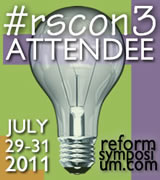It isn’t over yet, but I like to reflect by writing and so here I am…. tap, tap, tap. I just finished listening to the Couros Brothers entertain and inform up to 200 people whilst drawing a comparison between schools and a family restaurant. These brothers have a beautiful ability to get meaningful messages in a very user friendly package. I won’t paraphrase because you can see the recording if you like and I would not do justice to their message. Instead I will ‘steal’ a few quotes and explain how they fit into my reality or how they connect to other RSCON3 experiences.

Who is going to argue with this ? No teacher I know would say that they want to teach a class of the same child x 24. No principal would want a staffroom of teachers with the same skills, interests and passions. Thankfully we have many processes and methods in place that allow students and teachers the flexibility to apply their skills, expand their passions. No doubt we could improve these opportunities and I think this weekends conferences have focussed on the many ways Web 2.0 can work towards that goal. Pernille Ripp’s inspiring session on Blogging was the best summary I have heard of how the simple KidBlog application can change lives.

Mingling virtually is easy and this weekend has been a great opportunity. I admit to probably preferring to hide behind the keyboard when sharing my thoughts, letting my fingers do the talking. My stuttering nervousness comes out when face to face and I am often left with regrets that I “should have said that” or wish “I did not say that”. Twitter is a great place to mingle and thereby catch up with what is going on out there. Henrietta Miller exposed us in her presentation to her Teachmeet idea and from within that room and new #TMmelb was born. The concept here, is that ‘Twitter friends’ actually arrange face to face meetings in local areas (Henrietta lives in Sydney so she hosted one at her school). They agree to share something with the others attending but in general it sounds like a great chance for a chat that informs as well as affirms. What happens with TMmelb will remain to be seen.
Blogging is also a great way of mingling – reading other blogs is like walking in between conversations at a party, dipping in, staying if it interests or tuning out and moving to the next group. Stop and stay and chat and leave comments or just listen in, read and move on.

I guess this is similar to the previous idea – learning does not occur in isolation. Chuck Sandy in his keynote spoke about the MASHCollaboration Site – A professional development for teachers. The motto being, Meet, Ask, Share and Help. This seems to embody George’s comment about learning being social. (I really want to listen to that keynote again as it was very powerful). Both Henrietta Miller’s TeachMeets and Pernille Ripp’s student blogs are also evidence of learning being enhanced, even driven, by socialising, connecting with others. Personally, as many know, last year I participated in an on-line course that deepened my understanding of Web 2 tools. It was very successful and I believe that was mainly due to the interactive nature of the course, connections between myself and the other learners (many from my own school). The days of walking in to a classroom and judging the success of the lesson or the skills of the teacher by the level of the noise are long gone – learning is messy and noisy, due to it’s social nature.
 You can almost feel the passion when the Couros brothers speak – when they draw an analogy between their family history and their work as educators, it is passion driven. Hearing Pernille speak about her classes concern for blogging buddies in Egypt during the time of civil unrest, there is nothing but passion. The emotions are involved and that creates motivation and hopefully that leads to great learning.
You can almost feel the passion when the Couros brothers speak – when they draw an analogy between their family history and their work as educators, it is passion driven. Hearing Pernille speak about her classes concern for blogging buddies in Egypt during the time of civil unrest, there is nothing but passion. The emotions are involved and that creates motivation and hopefully that leads to great learning.
So that is how I am connecting what I have heard so far ……. thanks to all those passionate speakers who inspire us and keep us on our ‘educational toes’
In case you have not heard of this Symposium it is 48 hour feast of Professional learning conducted entirely on-line, relying on volunteer presenters and organisers, Details here.
Anyone else had interesting RSCON3 experiences ?



